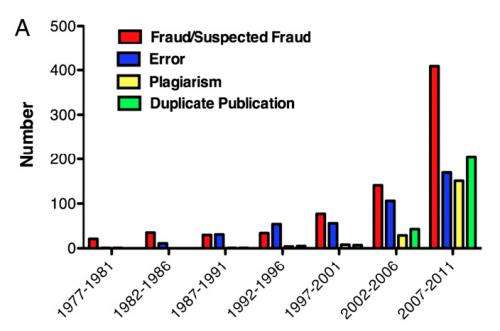Misconduct, not error, accounts for most scientific paper retractions, new study finds

In sharp contrast to previous studies suggesting that errors account for the majority of retracted scientific papers, a new analysis—the most comprehensive of its kind—has found that misconduct is responsible for two-thirds of all retractions. In the paper, misconduct included fraud or suspected fraud, duplicate publication and plagiarism. The paper's findings show as a percentage of all scientific articles published, retractions for fraud or suspected fraud have increased 10-fold since 1975. The study, from a collaboration between three scientists including one at Albert Einstein College of Medicine of Yeshiva University, published online today in the Proceedings of the National Academy of Sciences (PNAS).
"Biomedical research has become a winner-take-all game—one with perverse incentives that entice scientists to cut corners and, in some instances, falsify data or commit other acts of misconduct," said senior author Arturo Casadevall, M.D., Ph.D. , the Leo and Julia Forchheimer Chair and professor of microbiology & immunology and professor of medicine at Einstein. Dr. Casadevall is also editor-in-chief of the journal mBio.
The study reviewed 2,047 papers retracted from the biomedical literature through May 2012. To determine the reasons for the retractions, the researchers consulted several secondary sources, such as the National Institutes of Health (NIH) Office of Research Integrity and Retractionwatch.com, which investigate scientific misconduct.
The researchers found that about 21 percent of the retractions were attributable to error, while 67 percent were due to misconduct, including fraud or suspected fraud (43 percent), duplicate publication (14 percent), and plagiarism (10 percent). Miscellaneous or unknown reasons accounted for the remaining 12 percent.
"What's troubling is that the more skillful the fraud, the less likely that it will be discovered, so there likely are more fraudulent papers out there that haven't yet been detected and retracted," said Dr. Casadevall.
Earlier studies that underestimated the extent of scientific misconduct relied solely on the journals' retraction notices, which are written by the papers' authors, according to Dr. Casadevall. "Many of those notices are wrong," he said. "Authors commonly write, 'We regret we have to retract our paper because the work is not reproducible,' which is not exactly a lie. The work indeed was not reproducible—because it was fraudulent. Researchers try to protect their labs and their reputations, and these retractions are written in such a way that you often don't know what really happened."
The PNAS study also found that journals with higher impact factors (a measure of a publication's influence in scientific circles) had especially high rates of retractions. Dr. Casadevall attributes the growing number of retracted papers to the prevailing culture in science, which disproportionately rewards scientists for publishing large numbers of papers and getting them published in prestigious journals.
"Particularly if you get your papers accepted in certain journals, you're much more likely to get recognition, grants, prizes and better jobs or promotions," he said. "Scientists are human, and some of them will succumb to this pressure, especially when there's so much competition for funding. Perhaps our most telling finding is what happened after 2005, which is when the number of retractions began to skyrocket. That's exactly when NIH funding began to get very tight."
In a recent article in Infection and Immunity, Dr. Casadevall proposed various solutions to the problem of scientific misconduct, including:
- more emphasis on the quality of publications rather than quantity
- less emphasis on impact measures when rating journals
- fostering a cooperative and collaborative culture in the research community
- developing more stable and sustainable sources of research funding.
- creating more flexible career pathways to prevent the ongoing loss of capable scientists due to inadequate funding
More information: The PNAS paper is titled, "Misconduct accounts for the majority of retracted scientific publications."
Journal information: Proceedings of the National Academy of Sciences , mBio , Infection and Immunity
Provided by Albert Einstein College of Medicine















